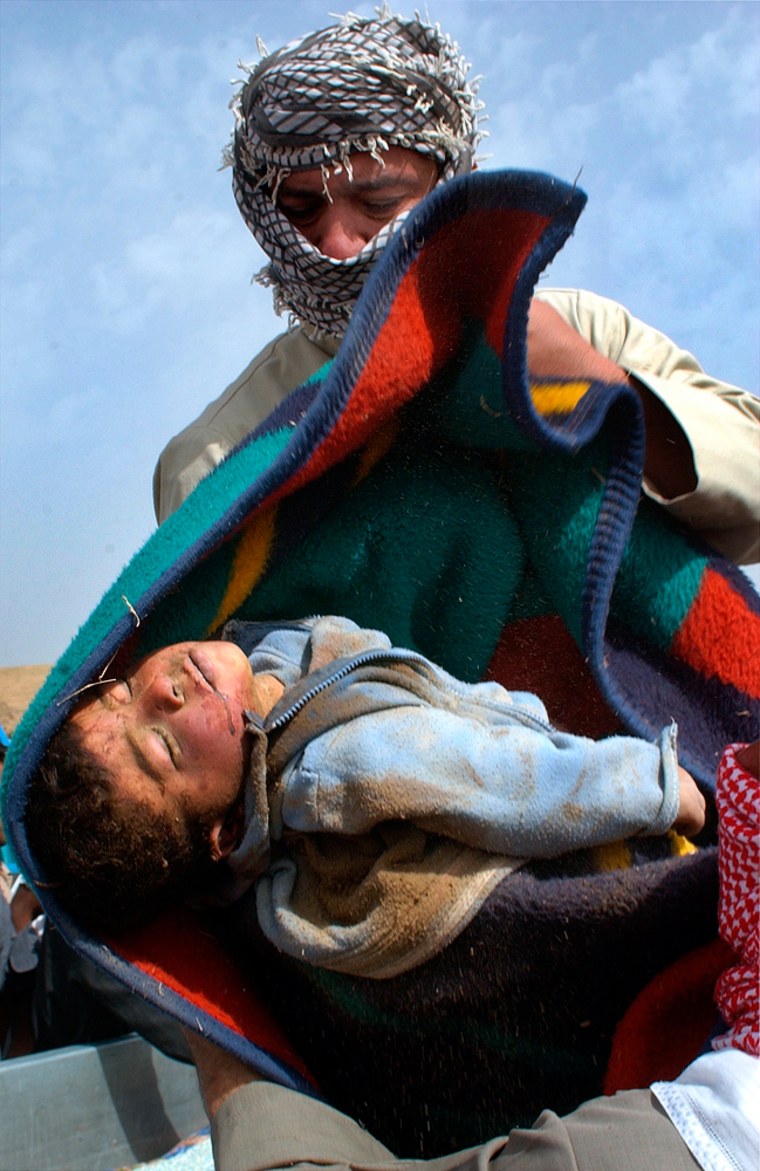U.S. forces flattened a house during a raid north of Baghdad early Wednesday, killing 11 people — mostly women and children, while insurgent attacks elsewhere left four dead, police and relatives said.
The U.S. military acknowledged the raid and said it captured one insurgent. It took place near Balad, about 50 miles north of the capital. But the military said only four people were killed — a man, two women and a child.
Authorities in the Shiite holy city of Karbala, 50 miles south of Baghdad, imposed a six-day driving ban starting Thursday to protect pilgrims from a wave of sectarian killing.
The U.S. military is dispatching an Army battalion of about 700 soldiers to Iraq from their base in Kuwait to provide extra security for pilgrimages connected to Monday’s holiday, officers said in Washington.
Monday marks the end of the 40-day mourning period after the death of Imam Hussein in A.D. 680. He was the grandson of the Prophet Muhammad and was killed in Karbala in present-day Iraq. Increased attacks marked the celebration, which draws thousands, in 2004 and 2005.
The decision to add the armored unit, perhaps for as little as 30 days, is in contrast to the Bush administration’s hopes to substantially draw down the U.S. military presence in Iraq. There are about 133,000 troops here.
American warplanes, armor used
Police Capt. Laith Mohammed, in nearby Samarra, said American warplanes and armor were used in the strike, which flattened the house and killed the 11 people inside.
An AP reporter at the scene in the rural Isahaqi area said the roof of the house collapsed, three cars were destroyed and two cows killed.
Eleven bodies, wrapped in blankets, were taken in three pickup trucks to the Tikrit General Hospital, about 45 miles to the north, relatives said.
Associated Press photographs showed the bodies of two men, five children and four other covered figures arriving at the hospital accompanied by grief-stricken relatives. The victims were covered in dust with bits of rubble in their hair.
Riyadh Majid, who said he was the nephew of the killed head of the family — Faez Khalaf — told AP that U.S. forces landed in helicopters and raided the home early Wednesday. Khalaf’s brother, Ahmed, said nine of the victims were family members who lived at the house and two were visitors.
“The killed family was not part of the resistance, they were women and children,” Ahmed Khalaf said. “The Americans have promised us a better life, but we get only death.”
Al-Qaida connections suspected
The U.S. military said it was targeting and captured an individual suspected of supporting foreign fighters for the al-Qaida in Iraq terrorist network.
“Troops were engaged by enemy fire as they approached the building,” said Tech. Sgt. Stacy Simon. “Coalition forces returned fire utilizing both air and ground assets.”
Bombs killed four more people and injured dozens Wednesday in Baghdad and north of the capital.
Three explosions hit Baqouba, 35 miles northeast of Baghdad. A suicide bomber on a bicycle missed a police patrol, killing two civilians and injuring six others, police said. The provincial command said the explosives appeared to have detonated prematurely as the cyclist approached the patrol.
Later, an explosion in a cell phone shop killed two more people and injured 12, police said.
Another bomb targeting a police patrol injured two officers, police said.
The Iraqi army hit back Wednesday, arresting about 20 suspects and confiscating weapons in a dawn raid in a nearby farming area, said Lt. Col. Tarik Muhei.
Shiite official's son killed
Late Tuesday, a roadside bomb exploded as Ali Karim, an official with the Shiite Badr group, drove through Tuz Khormato, 130 miles north of Baghdad. He was unhurt but his son was killed and nine other people were injured, said police Brig. Sarhad Qadir. The Badr group is linked to a Shiite militia accused of widespread abuses by Sunni Muslims.
The deaths of 87 men were blamed on deepening sectarian violence in recent days — most of them shot to death execution-style. Twenty-nine of the bodies were dug out of a single grave Tuesday in a Shiite neighborhood of east Baghdad.
The timing of the killings linked much of the bloodshed to revenge slayings for a bomb and mortar attack in a Baghdad Shiite slum that killed 58 and wounded more than 200 on Sunday.
Revenge was swift in some cases, and on Monday and Tuesday, police uncovered the bodies, marking the second wave of sectarian retribution killings since bombers destroyed the golden dome of a Shiite shrine in Samarra on Feb. 23. More than 500 people were reported killed, many of them Sunni Muslims and their clerics. Dozens of mosques were damaged or destroyed.
Underlining the uneasiness in Baghdad, Interior Ministry officials imposed another driving ban — from 8 p.m. Wednesday to 4 p.m. Thursday — to guard against bombings while the Iraqi parliament holds its first session since the Dec. 15 election.
After the driving ban was announced, the Cabinet said Thursday would be a holiday in the capital. Restrictions on movement also were put in place on the two weekends after the Samarra bombing.
Scores of frightened Shiite families have fled predominantly Sunni parts of Baghdad in recent weeks, some at gunpoint.
On Tuesday, the U.S. command reported the deaths of two more soldiers in fighting in insurgent-infested Anbar province. That raised the death toll of U.S. military members killed since the start of the war in March 2003 to 2,310, according to an AP count.
